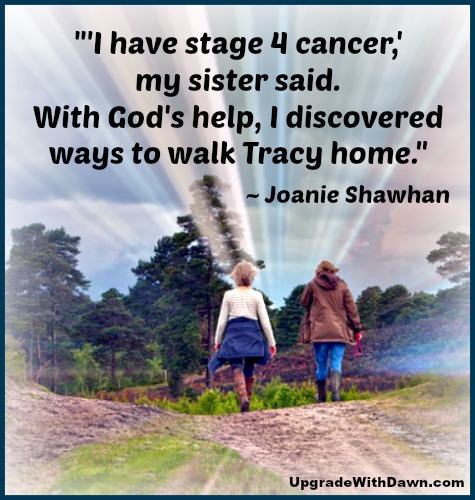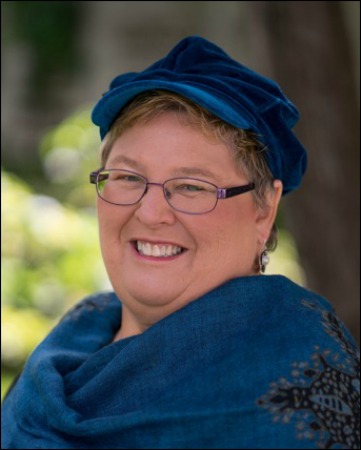Walking a Loved One Eternally Home
Joanie Shawhan writes words of encourgement to those touched by cancer and other painful struggles, writing from her own experience and wisdom to encourage us in this Grief  UPGRADE. Joanie writes about a phone call she received:
UPGRADE. Joanie writes about a phone call she received:
“'I have stage 4 cancer,' my sister Tracy said. I groaned as I tightened my grip on the phone."
I'm sure you would agree with me (Dawn)—this is one of the most painful phone calls we can receive. But what do we do with that information?
The Lord says, "Precious in the sight of the Lord is the death of his saints" (Psalm 116:15); but what choices might we have in the days before they go to their eternal home?
Joanie continues . . .
How could this happen to my sister? She goes to the gym everyday.
As a cancer survivor and a nurse with an oncology background, I was familiar with stage 4 cancer. But a few days later, my heart sank.
God had whispered in my spirit, “Walk her home.”
How do I say goodbye to my sister nine years younger, nine hours away and nine years old when I left home? We had rarely visited or talked with one another between crazy schedules and multiple states.
How DO I walk my sister home? How do we WALK our loved ones home?
With God’s help, I discovered ways to walk Tracy home.
1. Pray.
- Ask God how to pray for them.
- Ask our loved ones for their prayer requests. My sister wanted prayer for the pain.
2. Encourage. Share encouraging words, scriptures and songs.
I sent my sister a Bible, but would she feel well enough to read it? I created daily memes with scriptures of God’s love, comfort and faithfulness.
3. Listen.
Some people want to talk about dying. Tracy did not want to talk about cancer, death or anything negative.
4. Respect.
We need to respect their choices.
Tracy had a rare bladder cancer resistant to both chemotherapy and radiation with a life expectancy of three to six months.
She did not want to live the rest of her days sick from chemotherapy. Instead, she chose two weeks of alternative treatment in Mexico followed by a home regimen.
5. Contact. Call, text and send cards.
I discovered that Tracy was more receptive to conversations starting with “What’s up?” rather than “How are you?” This gave her the option to talk about things other than cancer.
She preferred to text when her breathing grew labored.
6. Gifts.
My sisters and I sent flowers, Polish pottery, tea, books, DVD’s, and hand-knitted socks and blanket.
7. Meals.
Tracy’s co-workers ordered food from a local restaurant when they heard family were in town. There were so many leftovers that she invited her co-workers for dinner the following day.
8. Finances.
A devastating diagnosis can drain the family’s finances.
Tracy’s treatment in Mexico was expensive and not covered by insurance. One of my sisters set up a Medgift * account for her.
9. Visits.
Visits from friends and family can be great distractions from sickness and pain. But they can also be exhausting.
Some days our loved ones may feel better than other days.
Call or text to see if they would like a visit.
10. Outings.
Movies, shopping trips and walks provide wonderful distractions.
11. Serve.
Offer specific help such as childcare, housekeeping or lawn care.
- Tracy wanted help taking down her Christmas decorations.
- As part of staging their house, my brother painted and laid flooring.
12. Prepare.
Prepare for the loved ones left behind.
Help videotape messages, sort photographs or write cards for special occasions. Tracy and I sorted through her childhood photos.
13. Celebrate.
My brother-in-law brought Tracy into town for an old-time family dinner. Fourteen of us gathered around the table set with china that hadn’t been outside of a hutch in over twenty years. Wisecracks, laughter and family stories mingled with the aroma of roast beef.
For a little while we could forget that this weekend would be our last time together.
14. Hope.
Allow hope.
Between staggered breaths, Tracy had said, “We’ve had lots of miracles in our family. I hope there is one more miracle for me.”
My sister still clung to hope despite starting oxygen and entering hospice.
On Good Friday, Tracy’s husband texted, “Her condition has worsened. I don’t know how long she has.”
My Mom, sisters and I arrived in town to be with Tracy during her last days. We enjoyed Easter together, Tracy hooked up to oxygen, swinging on the patio and soaking in the sun.
Early the next morning, Jesus received her—eternally home.
I am sure she would say along with the psalmist David:
“When I awake, I will see you face to face and be satisfied” (Psalm 17:15b NLT).
How would you lead a loved one eternally home?
 Joanie Shawhan is an ovarian cancer survivor and a registered nurse. She writes encouraging articles for women undergoing chemotherapy. She also speaks to medical practitioners in the Survivors Teaching Students program. Visit Joanie's website.
Joanie Shawhan is an ovarian cancer survivor and a registered nurse. She writes encouraging articles for women undergoing chemotherapy. She also speaks to medical practitioners in the Survivors Teaching Students program. Visit Joanie's website.
Graphic adapted, courtesy of Kaz at Pixabay.
* MedGift is a non-profit with resources and tools for those facing a health-related hardship or need.
 1 Comment → Posted on
1 Comment → Posted on  Tuesday, April 17, 2018 at 7:35AM
Tuesday, April 17, 2018 at 7:35AM  Cancer,
Cancer,  Cancer Survivor,
Cancer Survivor,  Dying,
Dying,  Grief,
Grief,  Grief counsel,
Grief counsel,  Joanie Shawhan,
Joanie Shawhan,  Oncology,
Oncology,  Upgrade with Dawn Upgrade Your Life
Upgrade with Dawn Upgrade Your Life  Caregiving,
Caregiving,  Grief
Grief 




Reader Comments (1)
Beautiful and a bit heart-breaking and wonderfully practical. So much sound advice here!